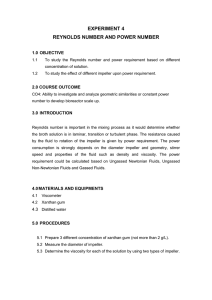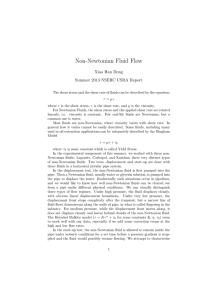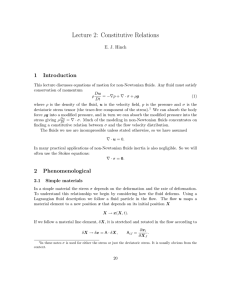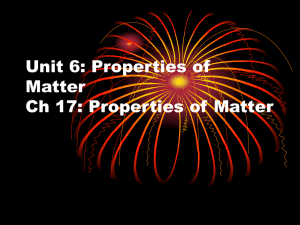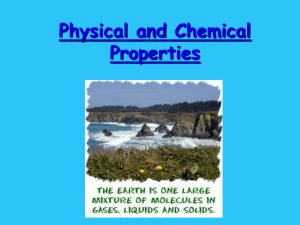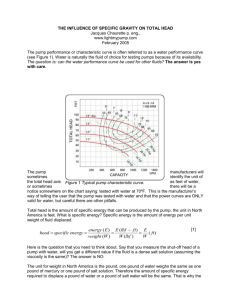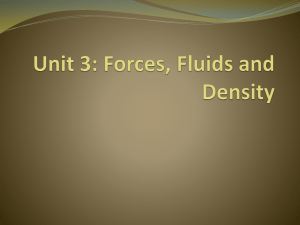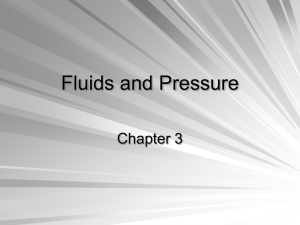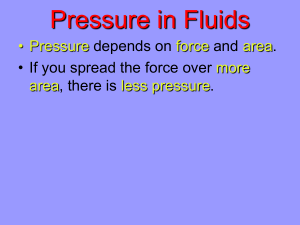Ooze, Flubber & Quicksand - Sheryl Hoffmann
advertisement
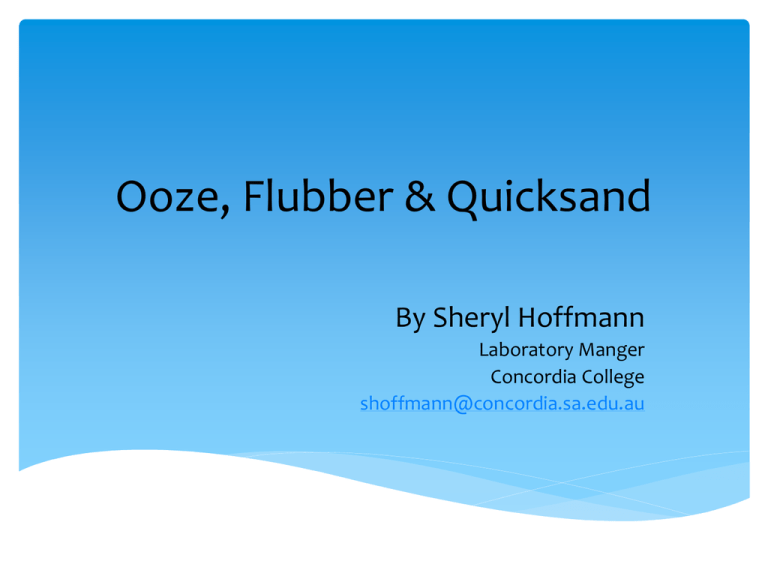
Ooze, Flubber & Quicksand By Sheryl Hoffmann Laboratory Manger Concordia College shoffmann@concordia.sa.edu.au How do you define what a liquid is ? Activity 1 - Water Take a cup of water & a pop stick. Stir the water. Stir it fast & stir it slowly. Poke it fast & poke it slowly. Try to heap it up on one side. Activity 2 - Ooze 1. 2. Take a plastic cup & add 3 rounded teaspoons of cornflour. Add water slowly, mixing, until you get a smooth but very thick paste. Stir it fast & stir it slowly. Poke it fast & poke it slowly. Try to heap it up on one side. Try rolling it into a ball. Does the ooze behave in the same way as the water? Is the ooze a liquid or a solid? Water is a Newtonian Fluid Ooze, Flubber & Quicksand are all Non-Newtonian Fluids ‘THE’ Apple Tree Newtonian Fluids A Newtonian fluid (named after Isaac Newton) is a fluid whose stress versus strain rate curve is linear and passes through the origin. The constant of proportionality is known as the viscosity. [Wikipedia] Newtonian Fluids A fluid that has a constant viscosity at all shear rates at a constant temperature and pressure, and can be described by a one-parameter rheological model. An equation describing a Newtonian fluid is given below. Newtonian Fluids Basically: The viscosity of a Newtonian fluid, depends only on the temperature and pressure, not on the forces acting upon it. Newtonian Fluids Examples: Water, sugar solutions, glycerine, silicone oils, light-hydrocarbon oils, air and other gases. ie Most low molecular weight substances, solutions and gases Non-Newtonian Fluids A non-Newtonian fluid is a fluid whose flow properties differ in any way from those of Newtonian fluids. Most commonly the viscosity (resistance to deformation or other forces) is dependant on shear rate or shear rate history. [Wikipedia] Non-Newtonian Fluids Basically: They aren't solids, yet they don't follow Newton's definition of fluids either! A fluid is called non-Newtonian if its viscosity depends on the force that is applied to it. Non-Newtonian Fluids Examples: ketchup, toothpaste, starch suspensions, sand in water, paint, clays, cream and shampoo. 4 Main Types 1. Shear Thickening 2. Shear Thinning 3. Thixotropic 4. Rheopectic Shear Thickening Also called Bingham plastic Apparent viscosity increases with increased stress The surface of a Bingham plastic can hold peaks when it is still. Shear Thinning Also called pseudoplastic Apparent viscosity decreases with increased stress. Ex paint: one wants the paint to flow readily off the brush when it is being applied to the surface being painted, but not to drip excessively. Thixotropic Viscosity decreases with stress over time Example: Honey – keep stirring, and solid honey becomes liquid Rheopectic Viscosity increases with stress over time Example: Cream – the longer you whip it the thicker it gets Quicksand Quicksand forms when water saturates an area of loose sand and the sand is agitated. When the water trapped in the sand cannot escape, it creates liquefied soil that cannot support weight . [Wikipedia] Quicksand There are two ways in which sand can become agitated enough to create quicksand: Earthquakes Flowing underground water You won’t drown Objects in the liquefied sand sink to the level at which the weight of the object is equal to the weight of the displaced sand/water mix and the object floats due to its buoyancy. How to get out of quicksand Don’t panic Don’t thrash around Quicksand is twice a dense as water therefore it is more easy to float in than water Use slow movements Spread arms & legs & float References Wikipedia How Stuff Works: http://science.howstuffworks.com/environmental/ear th/geology/quicksand1.htm Chhabra, R P, Non-Newtonian Fluids: An Introduction http://www.physics.iitm.ac.in/~compflu/Lect-notes/chhabra.pdf Science Learning http://www.sciencelearn.org.nz/ScienceStories/Strange-Liquids/Non-Newtonian-fluids Copy of This Powerpoint http://sherylhoffmann.weebly.com/ Creative Commons Creative Commons This copyright work is licensed under a Creative Commons Attribution-Noncommercial 3.0 Australia licence. To view a copy of this licence, visit http://creativecommons.org/licenses/by-nc/3.0/au/ In essence, you are free to copy, communicate and adapt the work for non-commercial purposes, as long as you attribute the work to Sheryl Hoffmann and abide by the other licence terms. Contact information: Sheryl Hoffmann Phone: +61 8 8291 9325 Fax: +61 8 8272 1463 Email: shoffmann@conconcordia.sa.edu.au Christchurch Earthquake Clip Catalyst Thursday, 24 May 2012 http://www.abc.net.au/catalyst/stories/3510004.htm Activity 3 1. Slime 2. Flubber 3. Super Ball
